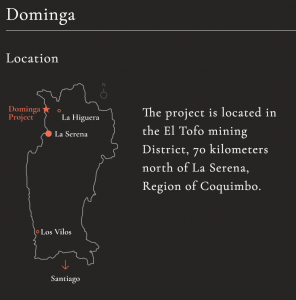Andes Iron and Chilean ME enter conciliation process over $2.5-billion project
Attorneys from Antofagasta's First Environmental Tribunal, together with company executives, researchers and conservation experts, visited, flew over and sailed around the site where Andes Iron's Dominga mine and port project would be located, in the central Coquimbo region. The trip was part of an evaluation process the court was prompted to undertake following Andes Iron's appeal of an August 2017 decision that forbade its $2.5-billion copper and iron ore project from going forward.
"The goal of this visit is to be able to explore the terrain so that we can have an informed opinion and also provide the lawyers from the different actors involved with an opportunity to make their own observations," the court's president, Daniel Guevara, told local media.
Guevara's office asked Chile's Ministry of Environment and Andes Iron to enter a conciliation process starting on March 14, 2018, just three days after the Sebasti??n Pi??era government takes power. The president has been accused of intervening in favour of the project during his first term at the Moneda Palace, when members of his family were shareholders. Pi??era has denied those allegations.
According to Portal Minero, Judge Guevara wants to set a precedent so that these kinds of disputes can be solved in a less confrontational manner. There is only one previous case, in the environmental assessment realm, where the Supreme Court prompted two parties in dispute to reach a mediated agreement.


Such conciliation process should lead to improvements in the project design which, if executed, could potentially lead Andes Iron to apply for a new environmental licence. Incumbent Environment Minister Marcelo Mena has repeated several times that, as it stands right now, the project cannot go ahead.
The ministers of Economy, Energy, Environment, Agriculture, and Health agree with Mena. When issuing their final decision last year, they all said Dominga has too many flaws particularly when it comes to the lack of mitigation plans for its environmental impacts. In particular, they expressed concerns about the site's proximity to a popular Humboldt penguin reserve and the Andes Iron's failure to consult local communities.
This is not the first time the privately-held Chilean company appeals a decision against the mine. Back in March 2017, Dominga was also voted down by the evaluation service of the Coquimbo region. That's when Andes Iron decided to submit the project to a special ministers' committee, only to end up with a negative from them as well.
The Dominga complex, which included open pit mining, a processing facility, a desalination plant and a port, would have produced 12 million tonnes of iron ore a year, becoming the country's largest mine of its kind. The operation would have also produced 150,000 tonnes of copper annually.